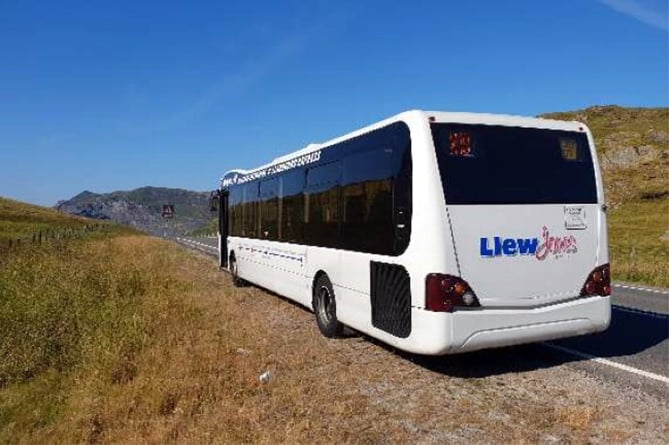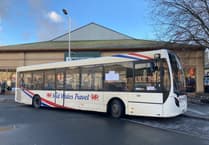Governments across Great Britain stepped in to provide support to bus companies when passenger numbers collapsed at the start of the Covid pandemic.
In Wales the Bus Emergency Scheme (BES) spent £157 million to keep bus firms going. Budget documents suggest it was worth £28m in 2022-23 alone.
It was due to end in March this year, following discussions with the mostly-private industry the Welsh government extended BES, but only for three months.
After a public outcry, BES was extended again — but only for three weeks and to coincide with the end of the academic year on 24 July.
What happens then is still up in the year — but the reality is fewer buses and leaner timetables will mean more service cuts and more communities left off routes.
Llew Jones Coaches ended the T19 service between Blaenau Ffestiniog and Llandudno serving the Conwy Valley in Gwynedd and Conwy.
The service ended just 18 months after it was reintroduced. Its end was bitterly fought by local politicians and villages in the communities served by the lifeline.
According to Bus Users UK, a pressure group that campaigns for accessible and inclusive transport, rural deprivation and an ageing population has led to a heavy reliance on bus services with local communities now struggling to access essential services, education, employment and leisure activities.
Along with Conwy Council, Gwynedd Council, Transport for Wales and Welsh Government, it held three meetings in Blaenau Ffestiniog, Dolwyddelan and Llanrwst to assess the impact of the axed T19 service.

“Unsurprisingly, the main concern raised by local residents was over the frequency of bus services and the lack of evening and Sunday services, leaving many people unable to get to healthcare appointments at hospitals, GPs, optometrists and dentists. Shops and banks are also difficult to access and there are fears that the lack of services to and from schools and Coleg Llandrillo could affect the future opportunities for young people in the area,” the group says.
Anyone looking to travel from rural areas to towns for work face limited and unreliable services with few, if any buses, operating outside of normal working hours. The resulting impact on shift work has been considerable with a local care home reporting daily struggles for staff attempting to get to and from work.
“There is a large proportion of retired people living in the valley who rely on public transport not only just for travel, but to maintain their freedom of movement and mental wellbeing,” one resident told the hearings.
“My daughter had chosen to study for her A-levels at Ysgol Dyffryn Conwy Llanrwst. Cancelling the morning bus from Blaenau Ffestiniog to Llandudno has put plans in jeopardy. She is dependent on the bus to make the best choice for her future,” another attendee said.
Similarly, access to employment was a major concern with the end of the T19.
“There are no longer any services after 6.30pm making it impossible for anyone who lives in these areas to work outside the valley except during basic office hours, or if they drive.
“We are a care home; we have staff that live outside of the town that are really struggling to get to work. The buses that we have do not run at a time to enable local people to get to work on time and then they stop early so staff struggle to get home,” one meeting was told.
“As a non-driver it is difficult and inconvenient having to rely on people to take you to appointments in Llandudno Hospital.
“The main priority should be access to the Conwy Valley. Hospital and optician visits are impossible.
“I am unable to go to Llandudno hospital for check-ups, unable to go to the bank or dentist and can’t do shopping for essential things.”
“Losing the bus would be a huge loss for us in Dolwyddelan. Having the bus call is a great help for going shopping, going to appointments, hairdressers and the library in Llanrwst,” another resident said.
The end of the T19 also ended hopes for fuller integration between rail and bus services in the region.
“The way the current timetable for the trains, 19 bus and 19X are set up, there are big gaps through the day when there is no transport and then a bus and a train within half an hour of each other. If these timetables could be arranged in such a way that there are less gaps, then that would be helpful,” one comment noted.
“Is there something that could be done to enable someone to travel one way by bus and the other by train? Would give passengers more options.”
“The train is expensive; it is more cost efficient to go to Llandudno by bus.”
Above all, the end of the T19 increased a sense of isolation
“We feel isolated here, people without cars depend on buses.
“Dolwyddelan is on the major trunk road between Blaenau and Llandudno.
“Surely in this day and age we deserve a regular bus service to access shops/doctors/opticians etc to lessen car and taxi use.
“Blaenau Ffestiniog always seems to be left out of any planning and spending and with UNESCO world heritage status, more should be done to revive the area,” one consultation hearing was told.
According to Barclay Davies, Bus Users director for Wales, the effects of transport poverty can be far-reaching: “Buses ensure people can lead active and fulfilling lives so the loss of such vital services will have a huge impact on local communities. The costs of loneliness and social isolation are significant and very often outweigh the cost of providing the bus service.”
Have your say on the issues that matter to you - get in touch today by email at [email protected] or phone on 01970 615000








